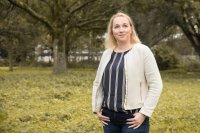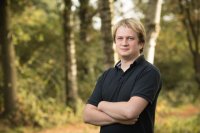Text Linda van der Nat photos Sven Menschel
On 6 July last summer, Ruben van Heck graduated with a PhD in Systems and Synthetic Biology, three days after his 26th birthday. After the ceremony in the Aula, guests suggested he might be the youngest PhD holder in the history of Wageningen. The suggestion took Van Heck by surprise. ‘I hadn’t given it any thought. It made my mother very proud but I had no strong feelings about it.’
Van Heck is certainly young to obtain a PhD, says WUR researcher Gab van Winkel, who is collecting data on all Wageningen PhDs for his own doctoral research. The average age of all PhD candidates to stand in the Aula in the past 97 years was around 35 years of age. But Van Heck was not the youngest ever. ‘The first doctorate was bestowed in 1920. If you go through all the almost 7000 PhDs, you’ll find 10 people who got their PhDs at a younger age than Ruben van Heck.’
Less rigorous
The youngest PhD graduate ever was Hendrik Robbertus Adrianus Muller, who was 23 when he became a Doctor of Agriculture on 10 January 1927, just three months after obtaining his Master’s. This illustrates how quickly you could get a doctorate in those days, says Van Winkel. ‘Often, the final thesis period of your Master’s degree and your PhD overlapped. The requirements for a Wageningen thesis were less rigorous in those days. You could count a study that you had done as part of your Master’s degree towards your PhD, for instance. You can’t do that anymore.’
An example is Wim Vermaas. He graduated in 1982 and got his PhD two years later. He extended his research internship at the University of Illinois and Michigan State University, and combined this with his doctoral research in Wageningen and Berlin. Two years and 14 publications later he gained the title of Doctor of Agricultural Sciences. That speed turned out to be typical of Vermaas: on tenure track he reached the rank of personal professor at an American university four years faster than the appointed period (see the interview below).
Quite an achievement
Stricter regulations have meant a drop in the number of young PhD graduates. Of the ten PhD holders who were younger than Van Heck when they graduated, nine did so before 2000, eight before 1990 and six before 1980. The last one was Marieke Verheijden, the only woman in the group (see the interview below). This reflects the demographics of doctoral research in the past, says Van Winkel. Nowadays there are more women than men PhDs.
Van Heck is the youngest of the roughly 3000 PhD graduates in the past 12 years. That is quite an achievement, says Van Winkel. ‘You don’t get extremely young PhD graduates anymore.’ Nevertheless, Van Winkel declines to predict whether there won’t be younger PhD holders in future. ‘But if there the youngest ever Wageningen PhD graduate stands in the Aula one day, she’ll be from Asia.’
‘WE ALL HAVE OUR TALENTS’
 *photo Samantha Lloyd***Wim Vermaas received his PhD in 1984 from Plant Physiology (Wageningen) and Physical and Biophysical Chemistry (Berlin)
*photo Samantha Lloyd***Wim Vermaas received his PhD in 1984 from Plant Physiology (Wageningen) and Physical and Biophysical Chemistry (Berlin)
, at the age of 24. Now he is Foundation Professor at the School of Life Sciences, part of the University of Arizona.**
Wim Vermaas graduated with distinction in 1982, and got his doctorate two years later, again with distinction. He doesn’t call himself clever, though. ‘We all have our talents and qualities, don’t we? I did get through my studies fast: I started in 1976 and got my PhD in 1984. How? I did a very nice degree. There was a small group of students, about five of us, so you can get through the material faster than in a bigger group and at some point you’re done.’
Vermaas also combined his work experience, a kind of internship, with his doctoral research period. At the University of Illinois and Michigan State University, he continued his research on photosynthesis at the molecular level for one and a half years instead of six months. ‘Nice things came out of that, which I was keen to work on in a PhD project.’ Because it was a fairly new subject area, Vermaas did not have the facilities he needed in Wageningen. ‘My supervisor introduced me at the Technical University in Berlin. I must have been the youngest both in Wageningen and in Berlin, but I never noticed it.’ Although? ‘Maybe I got the occasional comment like ‘here comes our young’un,’ but that was it. Of course I wasn’t some kind of prodigy who went to university at 16.’
Vermaas was keen to go further with work on the findings from his doctoral research but he didn’t think he stood much chance of doing so in the Netherlands. ‘I didn’t fancy waiting till someone retired, so I left for America, where I still had contacts from my work experience.’ After a postdoc in Delaware he ended up at Arizona State University, where his tenure track career went at lightning speed. He was a personal professor in eight years, whereas the appointed period for that is twelve years. ‘As a result, by the time I was 35, I couldn’t go much further in the academic system. That didn’t matter much to me. I made good use of my time, setting up a new faculty, for instance, and developing the academic discipline further.’
Students who both graduate with distinction and obtain PhDs often end up working in academia. Vermaas is no exception. ‘I knew when I was 18 that I wanted to go into science. I have an enquiring mind and I like investigating the unknown. I call it tinkering: how does this work, what is the underlying mechanism, how does it fit into the system? Improving the discipline, making new techniques possible – that is what drives me. And then I don’t mind going the extra mile.’
‘It all went pretty smoothly’

Marieke Verheijden got her PhD at the age of 25 in Nutrition & Health. She is now research manager for Explosions, Ballistics & Protection at TNO research institute.
Marieke Verheijden never officially started on a PhD. The researcher on the project she worked on for her Master’s thesis had to stop for personal reasons, and the university was looking for someone who could finish her work. Subsequently, so many follow-up questions came up that the research could generate a second thesis. Verheijden: ‘Because I didn’t want to get my PhD for someone else’s work, they extended the project. In the first year, most PhD researchers can only prepare for their research and don’t get started on it. I got off to a very smooth start because all the data were there.’
The rest of her research process went very smoothly too. ‘Of course I had a bad day now and then, but I was spared the notorious dip. I can still remember wondering at the end when things would go wrong, because it had all gone so well. Was it too good to be true? But nothing went wrong, luckily.’
After getting her PhD, Verheijden went to work at the TNO research institute. Having hardly noticed that she was the youngest during her PhD research, her age was noticeable now. ‘During a course on contact with clients they said: make sure you don’t look too young because people don’t expect a scientist with a doctorate to be a young girl. That annoyed me a bit.’
In fact Verheijden never noticed clients not taking her seriously. ‘Only when I became team leader and later head of department, and had to conduct performance evaluations did people wonder out loud whether I had enough authority and sensitivity. People expect a particular form of seniority. That doesn’t always go together with age, but counting the years is the easiest thing for a lot of people.’
It was a conscious choice not to go on in academia, says Verheijden. ‘There are people for whom a PhD is the gateway to the rest of their academic career. I was not driven by gaining a title. It was more that it was handed to me on a plate. I did something I enjoyed and almost without noticing I reached a point at which we could staple it together and call it a thesis.’
Verheijden can’t imagine herself becoming a scientist again. ‘For job satisfaction, I am better off in a workplace that is closer to everyday practice and more people-oriented. As a researcher you sit in your bubble getting a grip on your field of expertise. My world is much wider now. I see and talk to a lot more people. If I do something now, something changes now. If a researcher does something now, a nice article comes out at the end of the year.’
‘The main thing is that it looks good on my CV’

Ruben van Heck received his PhD in Systems & Synthetic Biology in July 2017, at the age of 26. He is now training to be a patent attorney at EDP Patent Attorneys.
Ruben van Heck is the youngest Wageningen PhD graduate in 12 years. The reasons for this are mainly practical, he says. When he was doing his Bachelor’s there was talk of student grants for Master’s degrees being abolished. ‘Then I thought, if I’m done with my Bachelor’s a little bit sooner I can get ahead and I’ll get a grant.’
He tapped into unexpected potential. ‘At first I didn’t work too hard and I got sevens. When I started to take twice as many courses, I did have to start working hard for exams and suddenly I was getting nines. Apparently it was a good way to reach my full potential.’ Eventually Van Heck finished his first and second degrees in four years, with a distinction for his Master’s.
Going on to a doctorate felt like a logical next step, he says. In the past four years, he has worked on the development of metabolic computer models. He was the youngest PhD candidate. ‘There were plenty of jokes about that, but nothing so specific that I’ve remembered it. The only time I really noticed I was younger than my cohort was during iGEM, an international student competition for synthetic biology. Two years after competing myself, I was a mentor. And I was younger than all eight students I coached.’
According to Van Heck, people were sometimes astonished to hear how young he was. Some saw it as inspiration to be more ambitious. Others felt the need to explain why they had not got so far themselves yet. ‘And then they often came out with the assumption that I didn’t do anything else but study and had no social life. Quite a natural reaction, but I thought it was a pity that some people saw my age almost as a personal attack on them.’
When he started on his doctoral research, Van Heck thought he would go on in research after that too. Gradually, he came to the conclusion that he had been seeing science through rose-tinted spectacles. He declined a postdoc position. ‘It really comes down to publishing as much as you can, because that’s the way you get funding. Research topics are chosen because they will lead to a good or an easy publication, whereas that shouldn’t be the goal. I spent a lot of time writing up the results as well as I could so that the article would score as highly as possible.’
Van Heck now works at a patent office. In the next few years he is going to study law, specializing in patent law. ‘So lifelong learning just goes on.’ So what did he get out of gaining a PhD so young? Van Heck laughs. ‘I think the main thing is that it looks good on my CV.’
